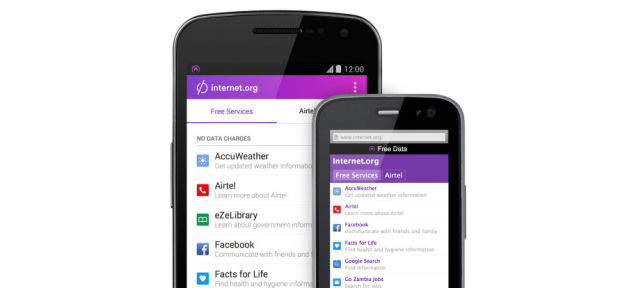Facebook and Google have grand plans to bring the internet to developing nations, paying Lisa Rinna-sized lip service to altruistic visions of global connectivity. But let’s always remember that these US tech giants are also gunning for new customers and the lucrative data that comes with them.
Both companies are rolling out programs in some African countries that give people free internet access — but the complimentary access is contingent on people using their services. Their large-scale world-connectivity projects are tailored to ensure that Facebook and Google become the go-to on-ramps for accessing internet:
Facebook, through its Internet.org program, offers a stripped-down version of its social network and some other sites for free in what it says is an exercise to “connect the two thirds of the world that doesn’t have Internet access”.
Google, in partnership with Kenyan mobile phone firm Safaricom, is rolling out its “free zone” in Kenya, where email and the Internet are available with no data charges, providing users stay within Google apps.
Bringing the internet to people without access is a worthy, necessary pursuit, but hooking people into the ecosystems of US-based multinational corporations doesn’t have to be part of the deal. The exclusive-freebie move could even potentially damage African tech innovation in the long run, as an advocacy group told Reuters:
“You are giving people the idea that they are connected to this free open world of the Internet but actually they are being locked up in a corporate digital prison,” Niels ten Oever, head of digital at rights group Article 19, told Reuters.
“Where will the African Mark Zuckerberg come from when they have no chance to compete?”
It’s hard for companies to compete with Facebook and Google in the US; in Africa, where these tech giants will have a huge leg up on local competitors, it will be even harder. By establishing themselves as home bases for the internet, Facebook and Google are elbowing control over the online experiences of a continent away from would-be domestic entrepreneurs and local startups.
If Google and Facebook successfully shunt the majority of internet traffic through their services, entrepreneurs in countries like Kenya and Zambia could be at a major disadvantage trying to produce homegrown social networks, messaging services, browsers, search — all the things freely dangled by the already-established US companies.
In countries with technological cultures that grew alongside the tech revolution in the US, the products of companies like Google and Facebook have competition from local offerings. In South Korea, for instance, most people search with Naver, a search engine based near Seoul. Not Google.
Relying on the same old exploitative global supply chains to hand out freebies doesn’t actually solve much. Good foreign aid is supposed to help empower local people to achieve their goals, not dump a top-down solution onto a desperate population. It’d be an encouraging sign if Facebook and Google started creating incentives for local tech talent to develop alternative, home-grown solutions. But of course, Facebook and Google aren’t conducting foreign aid, good or bad. They’re doing business.
[Reuters]
Picture: African migrants in Djibouti attempting to catch mobile phone signals from Somalia, by John Stanweyer/World Press Photo
